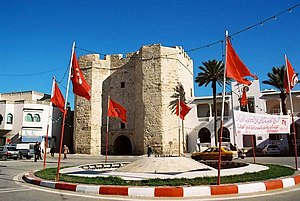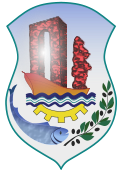Mahdia, Tunisia
|
Mahdia المهدية |
||
|---|---|---|

Skifa Kahla, ancient gate to the city
|
||
|
||
| Location in Tunisia | ||
| Coordinates: 35°30′N 11°04′E / 35.500°N 11.067°ECoordinates: 35°30′N 11°04′E / 35.500°N 11.067°E | ||
| Country |
|
|
| Governorate | Mahdia Governorate | |
| Population (2014) | ||
| • Total | 79,545 | |
| Time zone | CET (UTC1) | |
Mahdia (Arabic: المهدية ![]() al-Mahdīya) is a Tunisian coastal city with 79,545 inhabitants, south of Monastir and southeast of Sousse.
al-Mahdīya) is a Tunisian coastal city with 79,545 inhabitants, south of Monastir and southeast of Sousse.
Mahdia is a provincial centre north of Sfax. It is important for the associated fish-processing industry, as well as weaving. It is the capital of Mahdia Governorate.
The old part of Mahdia corresponds to the Roman city called Aphrodisium and, later, called Africa (a name perhaps derived from the older name), or Cape Africa. The Catholic Church's list of titular sees includes a no longer residential bishopric called Africa and, since there is no record of an episcopal see in Roman times called by either of these names (nor by that of Alipota, another Roman town that Charles Tissot suggested tentatively might be represented by present-day Mehdia), it is supposed that the episcopal see of Africa was established when the city was held by the Kingdom of Sicily, as a part of the Kingdom of Africa (1147–1160) and when Pope Eugene III consecrated a bishop for it in 1148. An inventory of movable property of the church of Africa (inventarium thesauri Africani) exists in an archive of the Cappella Palatina of Palermo in Sicily.
...
Wikipedia


